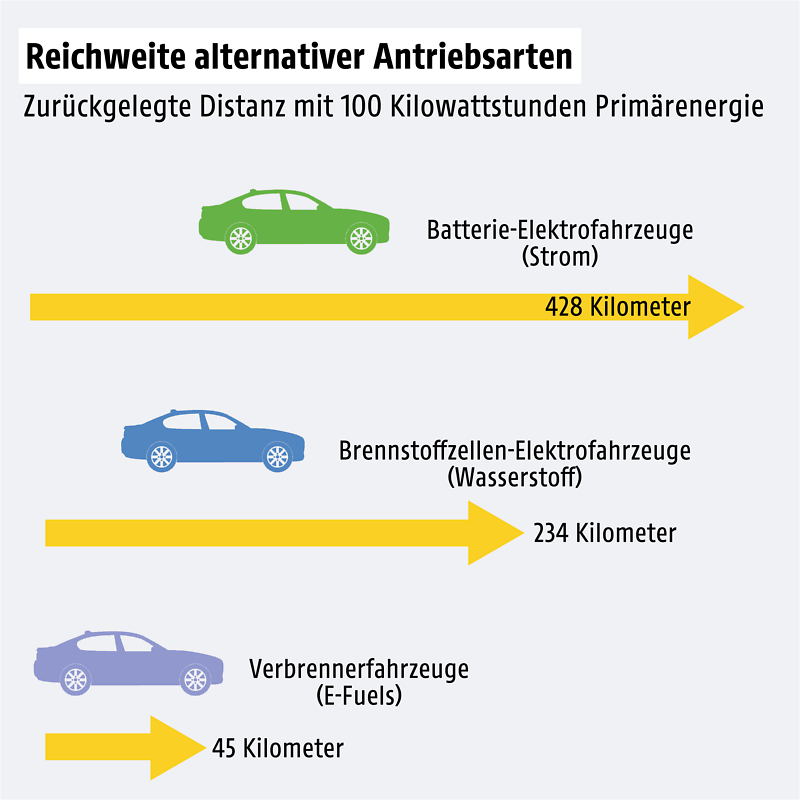From 2035, new cars that run on petrol or diesel will no longer be allowed to be registered in the EU. At the end of March, the EU countries finally decided to largely end new cars with combustion engines. After the compromise reached with difficulty, combustion engines can still be approved if they are fueled with e-fuels.
The ÖVP wants to keep the e-fuels option and calls drives with e-fuels “green combustion engines”. Wednesday’s summit at the Federal Chancellery was convened to discuss the future of the auto industry in Austria, as well as the use of e-fuels in cars. Representatives from science and industry were invited.
“Against bans on thinking”
E-Fuels
E-fuels are synthetic fuels that are generated using electricity. A lot of electricity is needed to produce it, between 16 and 27 kilowatt hours for one liter. It makes sense to use it where there are no alternatives, for example in aviation and shipping. Car manufacturers, for their part, are focusing on the expansion of e-mobility.
“Today’s event in particular is intended to show that we deal intensively with science,” said Nehammer at the beginning of the meeting. You have to think in longer terms. Much more could be possible in ten years, for example the efficiency of the use of e-fuels could become much better.
It is about “keeping the Austrian market so interesting for innovation, research and production that large industrial companies invest with us”. Austria not only has an important supplier industry, but also already has a high level of expertise in the production of e-fuels. The added value of the automotive industry in Austria amounts to 27 billion euros.
Pressure must also be built up at European level in order to take action “against bans on thinking”, said Nehammer after the summit. If you rule out possibilities in advance, you hinder research and development. But you have to exhaust all possibilities, whether with the “green combustion engine” or with thinking about e-mobility more broadly. 300,000 jobs in Austria would depend directly and indirectly on this.
ÖVP Labor Minister Martin Kocher emphasized that the public sector must support companies with subsidies. The climate and transformation offensive is already being implemented, with the aim of creating the conditions for promoting research and employees.
The chemist Robert Schlögl, President of the German Alexander von Humboldt Foundation, said: “First of all, I would give up this prejudice that the production of e-fuels is very inefficient.” Georg Brasseur, professor emeritus at Graz University of Technology, referred to the “limitation of the raw materials that we have in order to achieve this enormous energy transition”. Europe and Austria should not enter into new dependencies, such as “for example, now with the batteries from China”.
Much criticism from many quarters
Criticism from many quarters was voiced in advance. The FPÖ called it “pure show”, NEOS called for a summit on staff shortages instead of cars. Criticism also came from the SPÖ and the Greens, as well as from the environmental organizations Global 2000 and Greenpeace. According to Greenpeace, the chancellor is ignoring facts and wants to “pointlessly pump tax money into a technological impasse”.
Activists of the “last generation” sprayed the facade of the Federal Chancellery with an oily black liquid – according to their own statements it was a mixture of water, guar gum and paint that was washable and non-toxic.
The WU environmental economist Sigrid Stagl and Günther Lichtblau from the Federal Environment Agency also expressed skepticism about e-fuels. “Scientists for Future” in turn referred to the “catastrophic energy balance” of e-fuels.
However, support came from the Federation of Industrialists (IV), the Chamber of Commerce (WKO) and automobile importers. The ÖAMTC pointed out that e-cars alone would not be enough to achieve the climate goals in traffic. Planned rules for the production of e-fuels are too restrictive.
Similar to the ARBÖ: It’s about exploiting all available opportunities. The still young technology of synthetic fuels and e-fuels will continue to develop enormously.



